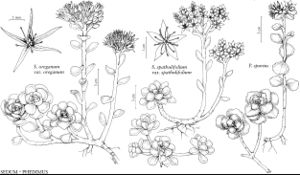Difference between revisions of "Phedimus"
Amer. Monthly Mag. & Crit. Rev. 1: 438. 1817,.
FNA>Volume Importer |
RevisionBot (talk | contribs) m (Bot: Adding category Revised Since Print) |
||
| (8 intermediate revisions by 3 users not shown) | |||
| Line 10: | Line 10: | ||
|hierarchy=Crassulaceae;Phedimus | |hierarchy=Crassulaceae;Phedimus | ||
|hierarchy_nav=<div class="higher-taxa"><div class="higher-taxon"><small>family</small>[[Crassulaceae]]</div><div class="higher-taxon"><small>genus</small>[[Phedimus]]</div></div> | |hierarchy_nav=<div class="higher-taxa"><div class="higher-taxon"><small>family</small>[[Crassulaceae]]</div><div class="higher-taxon"><small>genus</small>[[Phedimus]]</div></div> | ||
| − | |etymology=Greek | + | |etymology=Greek mythological name, possibly for Phaedimus, mythical son of Amphion and Niobe, slain by Apollo |
|volume=Volume 8 | |volume=Volume 8 | ||
|mention_page=page 147, 148, 149, 150 | |mention_page=page 147, 148, 149, 150 | ||
| Line 20: | Line 20: | ||
-->{{Treatment/Body | -->{{Treatment/Body | ||
|distribution=Europe;Asia. | |distribution=Europe;Asia. | ||
| + | |introduced=true | ||
|discussion=<p>Aizopsis Grulich; Asterosedum Grulich; Spathulata (Borissova) Á. Löve & D. Löve</p><!-- | |discussion=<p>Aizopsis Grulich; Asterosedum Grulich; Spathulata (Borissova) Á. Löve & D. Löve</p><!-- | ||
--><p>Species 20 (3 in the flora).</p><!-- | --><p>Species 20 (3 in the flora).</p><!-- | ||
| − | --><p>S. Mayuzumi and H. Ohba (2004) concluded that Phedimus forms a lineage distinct from Sedum in a strongly supported clade based on chloroplast and nuclear DNA sequences. Phedimus is characterized by having flattened leaves with serrate or crenate margins; Sedum has semiterete or very thickened leaves with entire margins (Ohba et al. 2000).</p> | + | --><p>S. Mayuzumi and H. Ohba (2004) concluded that <i>Phedimus</i> forms a lineage distinct from <i>Sedum</i> in a strongly supported clade based on chloroplast and nuclear DNA sequences. <i>Phedimus</i> is characterized by having flattened leaves with serrate or crenate margins; <i>Sedum</i> has semiterete or very thickened leaves with entire margins (Ohba et al. 2000).</p> |
|tables= | |tables= | ||
|references= | |references= | ||
| Line 32: | Line 33: | ||
{| class="wikitable fna-keytable" | {| class="wikitable fna-keytable" | ||
| − | |-id=key-0-1 | + | |- id="key-0-1" |
|1 | |1 | ||
|Leaves opposite; petals white to pink. | |Leaves opposite; petals white to pink. | ||
|[[Phedimus spurius|Phedimus spurius]] | |[[Phedimus spurius|Phedimus spurius]] | ||
| − | |-id=key-0-1 | + | |- id="key-0-1" |
|1 | |1 | ||
|Leaves alternate; petals yellow | |Leaves alternate; petals yellow | ||
|[[#key-0-2| > 2]] | |[[#key-0-2| > 2]] | ||
| − | |-id=key-0-2 | + | |- id="key-0-2" |
|2 | |2 | ||
|Leaf blades elliptic-lanceolate, 4-8 cm. | |Leaf blades elliptic-lanceolate, 4-8 cm. | ||
|[[Phedimus aizoon|Phedimus aizoon]] | |[[Phedimus aizoon|Phedimus aizoon]] | ||
| − | |-id=key-0-2 | + | |- id="key-0-2" |
|2 | |2 | ||
|Leaf blades spatulate-elliptic to obovate, 1.5-3 cm. | |Leaf blades spatulate-elliptic to obovate, 1.5-3 cm. | ||
| Line 66: | Line 67: | ||
|publication year= | |publication year= | ||
|special status= | |special status= | ||
| − | |source xml=https:// | + | |source xml=https://bitbucket.org/aafc-mbb/fna-data-curation/src/2e0870ddd59836b60bcf96646a41e87ea5a5943a/coarse_grained_fna_xml/V8/V8_465.xml |
|genus=Phedimus | |genus=Phedimus | ||
}}<!-- | }}<!-- | ||
| − | -->[[Category:Treatment]][[Category:Crassulaceae]] | + | --> |
| + | |||
| + | [[Category:Treatment]] | ||
| + | [[Category:Crassulaceae]] | ||
| + | [[Category:Revised Since Print]] | ||
Latest revision as of 18:46, 30 April 2021
Herbs, perennial, not viviparous, 0.5–5 dm, (often woody at base), glabrous [pubescent]. Stems erect or creeping, simple or branched, fleshy. Leaves persistent, cauline, alternate or opposite, (± alike), sessile [petiolate], (narrowed to base), not connate basally; blade orbiculate, obovate, spatulate-elliptic, or elliptic-lanceolate, laminar, 1–8 cm, fleshy, base not spurred, margins crenate (sometimes glandular); veins not conspicuous. Inflorescences terminal cymes. Pedicels absent. Flowers erect, 5-merous; sepals connate basally, all alike or unequal; petals spreading, erect basally and spreading distally or recurved at tip, nearly distinct, yellow, white, or pink; calyx and corolla not circumscissile at base in fruit; nectaries adnate to pistils as basal scales; stamens 10; filaments of antipetalous stamens adnate to corolla; pistils erect, nearly distinct; ovary base truncate; styles shorter than ovary. Fruits stellately spreading. Seeds ellipsoid, finely lined.
Distribution
Introduced; Europe, Asia.
Discussion
Aizopsis Grulich; Asterosedum Grulich; Spathulata (Borissova) Á. Löve & D. Löve
Species 20 (3 in the flora).
S. Mayuzumi and H. Ohba (2004) concluded that Phedimus forms a lineage distinct from Sedum in a strongly supported clade based on chloroplast and nuclear DNA sequences. Phedimus is characterized by having flattened leaves with serrate or crenate margins; Sedum has semiterete or very thickened leaves with entire margins (Ohba et al. 2000).
Selected References
None.
Lower Taxa
Key
| 1 | Leaves opposite; petals white to pink. | Phedimus spurius |
| 1 | Leaves alternate; petals yellow | > 2 |
| 2 | Leaf blades elliptic-lanceolate, 4-8 cm. | Phedimus aizoon |
| 2 | Leaf blades spatulate-elliptic to obovate, 1.5-3 cm. | Phedimus hybridus |
